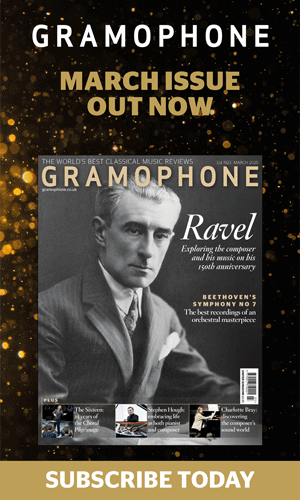Stephen Hough plays Chopin's F sharp Major Nocturne, Op 15, No 2
Monday, November 22, 2021
Film released to celebrate the pianist's 60th - plus, win a signed copy of his Nocturnes recording!
Stephen Hough - pianist, composer, author and artist - turns 60 today. To celebrate the occasion, and also the release of his new recording of Chopin's complete Nocturne's on Hyperion, we are delighted to bring you this beautiful video he has made for us of the F sharp Major Nocturne, Op 15, No 2.
It was filmed at the Hotel Bristol Vienna, located across the road from the Vienna State Opera and whose distinguished musical guests have included Richard Strauss, Rachmaninov, Puccini, Gershwin – and now, of course, the multiple Gramophone Award-winning pianist Stephen Hough too!
Win a signed copy of Hough's Chopin Nocturnes recording!
We have ten signed copies of Stephen Hough's new recording of Chopin's complete Nocturnes to give away. In the forthcoming December issue of Gramophone it's described as 'a release that neither students of Chopin nor lovers of fine piano-playing will want to miss'. To enter, simply click this link: Chopin Nocturne competition.
You can learn more about the recording at the Hyperion website, and by reading the pianist's reflections on these works in this excerpt from the booklet notes.
Stephen Hough on Chopin's Nocturnes
Chopin wrote no operas, even though that art form was his favourite and singers, not pianists, were his musical heroes. And despite his love for the human voice, he wrote barely any songs either – fewer than twenty, with only two published in his lifetime. These unambitious ditties, with their stiff, plain vocal lines accompanied by frequent um-cha-cha vamping, seem puzzling from this pianist-composer who idolized the human voice. Enter the nocturnes – a corpus of some of the finest operatic arias ever written. Here bel canto melodies abound, dramatic, tender and tragic, with virtuoso decoration reminiscent of a coloratura diva.
Singers need to breathe and so do pianists as they exhale the long lines of these nocturnes, more than half of which were given metronome markings by the composer. A metronome has two functions: to keep strict time as it ticks away in the practice studio, and to enable a composer to indicate more precisely than ‘andante’ or ‘allegro’ what tempo is desired. With Chopin both of these functions are relevant. He spoke of the left hand keeping time while the right hand was free (Mozart said something similar); and when Chopin marks dotted minum = 60, as in the perplexing and enigmatic nocturne Op 15 No 3, he is indicating a pulse as well as a tempo: one heartbeat per bar. There is significance too that his indications are generally faster than later norms (the much-loved Op 27 No 2 is a startling example). Chopin’s original tempi and long phrase markings encourage melodies to float in one breath across the bar lines; and his preferred Pleyel piano had a much faster decay of resonance than modern instruments, compelling the pianist to move on to the next note before the sound literally dies.
People who heard him play spoke of his mastery as an improviser and we can see this both in the way the right hand’s vocal lines unfold freely on top of the left hand’s accompaniment, and in his indecision about final versions of decorative detail. Each edition published in his lifetime, as well as his handwritten embellishments in pupils’ copies, shows Chopin’s improvisatory attitude towards ornamentation as something spontaneous and unfixed. In this recording I use a number of authentic variants, and the album ends with a second version of Op 9 No 2, incorporating some of those jottings from the scores of students.
In spite of their brevity, some of the nocturnes are masterpieces as great as anything written in the nineteenth century. The trajectory of Op 48 No 1, from its opening slow-stridden melancholy through the crescendo of the blazing central section to the hurried, anxious re-statement of the opening theme, is uniquely moving in a piece lasting less than six minutes; and Op 55 No 2’s miraculous interweaving (interchanging) of melody, harmony and counterpoint creates a seamless robe of ecstasy. But the final Op 62 set, above them all, seems a summation of Chopin’s whole creative life. Singing always, but speaking too. A testament to lyrical rapture, a tribute to the voice he loved above all: the piano.
© Stephen Hough
Earlier this year, Stephen Hough also joined us in the Gramophone Podcast to discuss his album, 'Vida breve': you can listen to it below:







